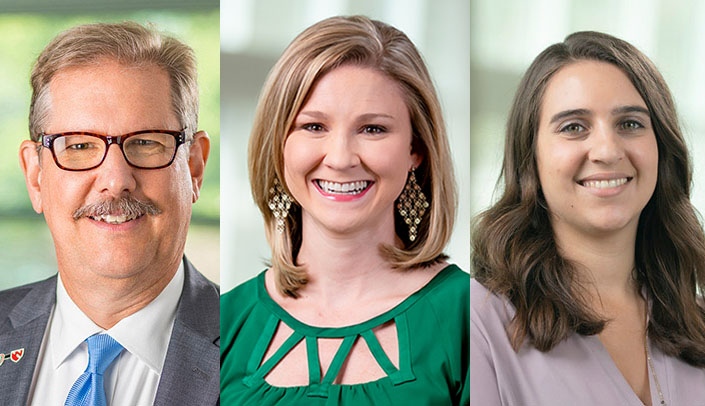The invasion of Ukraine weighs heavily on many within the UNMC community.
On Friday, the UNMC community gathered online to offer one another support, share concerns and learn more about self-care skills and campus counseling supports. The town hall was led by the UNMC Wellness team of Steve Wengel, MD, Kati Cordts, PhD, and Ali DeLizza, PhD.
Via video, UNMC Chancellor Jeffrey P. Gold, MD, reminded attendees that UNMC is here to provide support and is "mindful of the stress, worry and uncertainty created by these ongoing events."
Dele Davies, MD, senior vice chancellor for academic affairs and dean for graduate studies, agreed. "These are extraordinarily challenging times for our world, especially for the people of Ukraine and for every one of our students, faculty and staff who are from this part of the world. We also realize that what is happening in Ukraine impacts every one of us directly and indirectly, no matter where we are from."
After two years of the pandemic, people’s batteries already may be running low, said Dr. Wengel, assistant vice chancellor for campus wellness, and the unfolding events in Ukraine, distressing images and concern for loved ones in the region can be overwhelming.
In offering support, the group discussed how to work through difficult times including:
- Granting yourself permission to disconnect from the 24-7 cycle of news. As Dr. Wengel said, news is information, but like a powerful, yet necessary, heart medicine, it’s important to consume the right dose for you.
- Watching for stories of hope and humanity.
- Being discriminating consumers of news, knowing that misinformation and disinformation exist.
- Being intentional in ways that can make a difference, including sending aid and connecting with communities that can help offer support. One source, the U.S. State Department, outlines reputable relief organizations.
- Looking out and supporting the people around you who may be struggling.
- Seeking out such free and confidential campus resources as:
- The Office of Global Engagement, which focuses on visas and immigration services, but also can help international students, faculty and scholars find resources on campus. Email the office with questions.
- Employee Assistance Program, which is offered through Arbor Family Counseling. The 24-hour confidential service — available online and at 402-330-0960 — provides unlimited phone consultations, crisis debriefing services and five free sessions per problem/per year for employees and their family.
- Counseling and Psychological Services for UNMC students. The program, led by Jeff Knapp, associate director of CAPS, provides free confidential services in the Student Life Center and via phone at 402-559-7276.
- The House Officer Assistance Program, led by Susan Smith, who is available by phone and text at 402-559-5323. (After hours call 402-559-4000 and ask the operator to contact Smith.)
- Peers in Need of Support (PiNS), which provides colleagues with 1:1 peer support. Reach PiNS by email.
- The UNMC Wellness Team of Drs. Wengel, Cordts and DeLizza, who can provide stress management presentations and workshops, as well as individual consultations to departments/units.
- Find the full list of UNMC resources online at UNMC Wellness.
Said one town hall participant: "Thank you for holding this (town hall) and recognizing that (this) does impact us."
